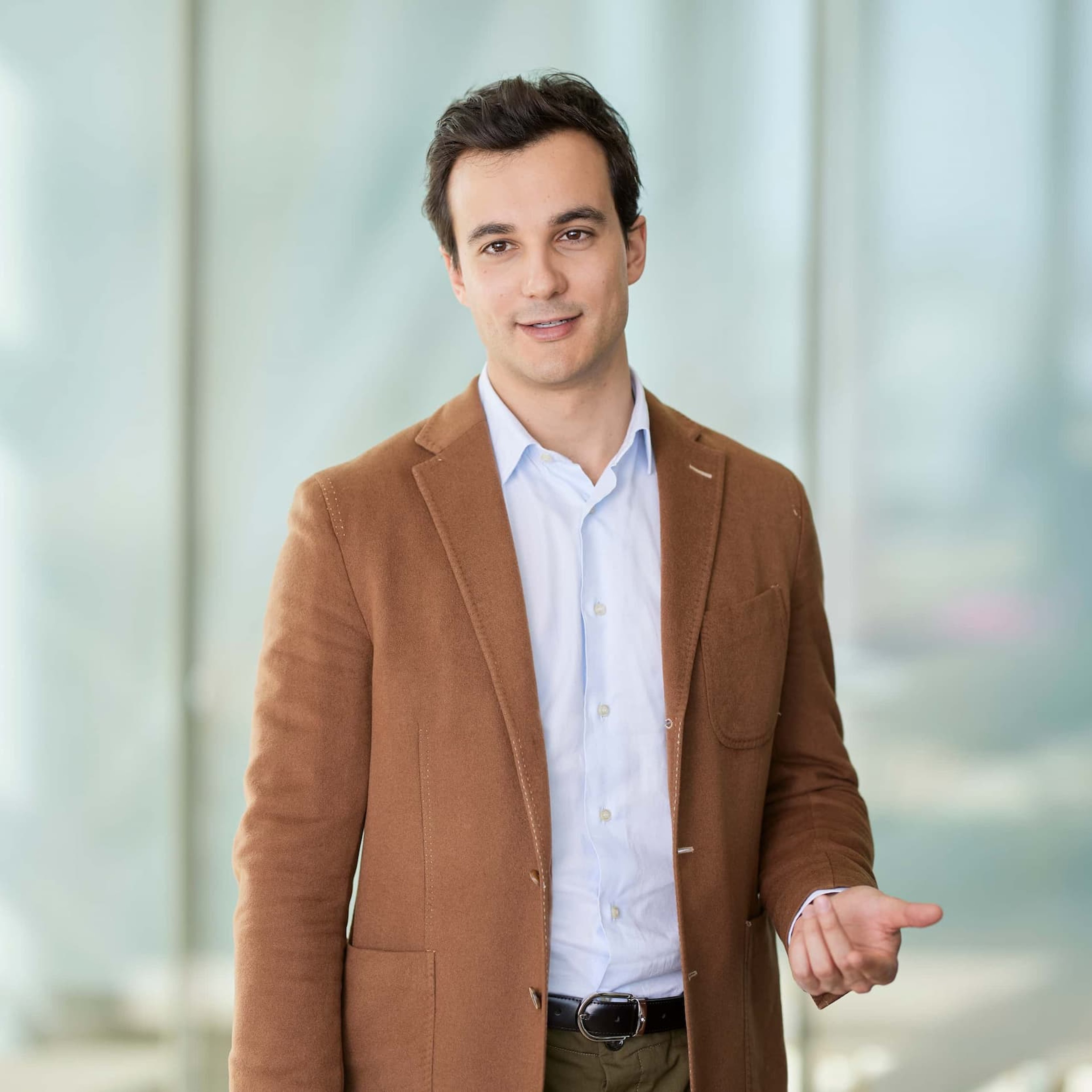Investment research
Investment research is about understanding where value lies. We look at opportunities from every angle and use creativity for in-depth qualitative and quantitative analysis, working to find investments that will grow clients' funds over the long term.
Applications for 2025 programmes are now closed.

Curious about the world?
Having an inquiring spirit and unique perspective is where we see the value in you. We understand that teams thrive when various backgrounds and interests come together with a curiosity about the world and a desire to learn. So, whether philosopher, mathematician, politics graduate or career changer, you can find your value here.
The equity programme
After a three-month induction to the firm and our investment culture, the programme offers three one-year rotations in different teams before finishing with a two-year placement in another.
You'll find that each team has its own distinct approach and investment philosophy, but all have the same purpose: to drive positive returns for our clients. So, whether those are councils, pension funds or governments, we’re dedicated to helping them meet their income and savings goals.
There are more than 20 Equity teams at Baillie Gifford – including Long Term Global Growth, Global Alpha and Global Income. They provide the thinking behind our Scottish Mortgage, Scottish American Investment Company (SAINTS) and Monks Trusts. We have geographical teams such as Japan and UK, as well as others with distinct themes such as Positive Change and Private Companies. You won’t have the chance to work with every team, but varied rotations will ensure you develop a broad understanding of the different approaches to equity investing.
As you research and imagine the long-term prospects for various companies, industries, and societal trends, we expect you to form robust opinions and write insightful reports. For example, we might ask you to research a mining company one-month, semi-conductors the next, and a fashion house after that.
Investing in equities carries an asymmetric risk: good decisions can make our clients many times their original investment, while failure is limited to what they put in.
Key facts
All of our programmes are permanent opportunities. You do not have to have graduated in the last three years to apply. If you accept a role at Baillie Gifford, we will be committed to your long-term career development throughout the programme and beyond.
£55,000 p/a
September 2025
Edinburgh
Training and development
Throughout the programme, you'll have a clear path with all the support you need to get moving.
Mentorship
With a manager in each rotation and a mentor supporting you throughout your analyst journey– you'll always have someone to turn to for advice.
The programme aims to ensure you have the resources you need, whether through foundational sessions in financial accounting, on-demand modules to strengthen your skillset, guidance and feedback on your research or conversations with your peers.
Professional qualifications
In your first two years, you’ll work towards both the IMC (Investment Management Certificate) and the CFA (Chartered Financial Analyst) Level 1 professional qualification – with in-house training provided, fees covered and generous study leave.
You’ll also complete our bespoke Psychological Readiness for Investment Insight Programme, created in partnership with The School of Life, to equip you with the cognitive, emotional, and behavioural skills to thrive as an investor.
And, with travel across the UK and the world, you’ll have the chance to learn more at conferences and meetings.
Future potential
Your growth doesn’t end with the programme. Professional development is a way of life here. You could move into fund management, focus on a specific sector, or join our Clients Department. Many of the partners who own the firm started in the Investment Research programme.
We are looking for curiosity about the world, a breadth of thinking, an ability to join the dots of seemingly unrelated topics to identify hidden investment opportunities and find those companies which can grow into the future.
Programme timeline
Throughout years 1-3:
- Behavioural skills learning programme with other BG trainees
- Ongoing book reviews and case studies with BG investors
Throughout years 1-5:
- Investment team work
- Quarterly ‘How I invest sessions’ with senior investors
- Ongoing ESG-focused learning
- Access to a wide variety of external speakers and events
Year 1
First annual placement
- 3-4 month induction to culture and key concepts
- Investment team work - starts following induction
- Analysis of financial statements training
- IMC qualification (compulsory)
Year 2
Second annual placement
- CFA Level 1 qualification (compulsory)
Year 3
Third annual placement
- CFA Level 2 qualification (optional, flexible timing)
- CFA Level 3 qualification (optional, flexible timing)
- ESG secondment
- Mock client meeting
- Training and competence sign off
Years 4 and 5
Start two year team placement
- Self-led investment relevant research project or experience (optional)
- Clients’ department secondment
- Increased exposure to operational business areas

Case study: Vittorio Lavioso
Meet someone who was on our Investment Research programme.
What is equity investing?
Our equity teams invest in public and private companies, with multiple teams focused on different industry sectors and geographical regions. We conduct detailed analysis with the aim of finding companies that have the potential to grow and add value for society over the long term. Our time horizon distinguishes us from other market participants. We look out five to ten years when analysing the growth prospects of a company.
Equity investors take ownership stakes in companies by buying ‘shares’, so called because they give their owners a percentage share of a company’s future financial performance. The purpose of equity investing is to provide cash to companies that want to invest in growth. Companies can issue new shares to investors in exchange for cash. Investors can also trade existing shares with each other through equity markets, but this does not raise new funds for the underlying companies.
Equities represent a claim on the future cash generation of a business. The value of a business is the discounted sum of these future cash flows. The future is unknowable so share prices represent market participants’ current views of the long-term prospects of a business. If the future performance of the business turns out to be better than expected, the shares will rise in value. If future performance is worse than expected, the shares will fall in value.
The job of an equity investor is to analyse a business and come to a view on its prospects. If their analysis leads them to be more optimistic than what is currently implied by the price of the shares, then they will buy the shares in anticipation of the share price rising. It can take many years for the growth characteristics of the strongest businesses to be fully reflected in share prices. This is why, at Baillie Gifford, we invest for the long term.
Life at Baillie Gifford
Like the look of the programmes? Discover what it’s like to work with us.
Keep in mind
Our research tries to focus on the potential success of a company rather than the risk of what could go wrong.
Introducing our Investment Research opportunities
You'll hear from our current trainees and manager about the structure of the programme, and hear advice on the application process and training opportunities.
Investment Research - Application Process Uncovered
You'll hear from the people involved in the recruitment process and analysts who have recently been through the process.
